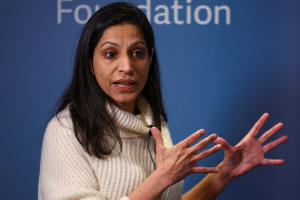BoE's Dhingra sees 'promising signals' of a fall in UK inflation
 Send a link to a friend
Send a link to a friend
 [June 27, 2023] By
David Milliken [June 27, 2023] By
David Milliken
LONDON (Reuters) -Bank of England policymaker Swati Dhingra said there
are "promising signals" for a further decline in British inflation,
based largely on a steep fall in the rate of increase in prices which
manufacturers charge to retailers.
Dhingra is one of two members of the BoE's nine-member Monetary Policy
Committee (MPC) who have consistently voted against the central bank's
interest rate rises since December.
In a speech to Britain's Royal Economic Society, Dhingra highlighted a
sharp drop in the annual rate of producer price inflation, which was
2.9% in May, its lowest in more than two years and down from a peak of
19.6% in July 2022.
Consumer price inflation (CPI), which is targeted by the BoE, peaked at
11.1% in October 2022 and has been slower to fall than the central bank
expected, holding at 8.7% in May.
The BoE forecast last month that CPI would drop to just over 5% by the
end of the year.
"There are some promising signals that CPI inflation should ease, and
that's mostly coming from ... one of the best leading indicators ... of
the long-run evolution of prices in this country, producer price
inflation," Dhingra said.
Other BoE policymakers have focused more on wages and core inflation, a
measure which strips out food, energy, alcohol and tobacco prices and
which rose to a 31-year high last month.

[to top of second column] |

Bank of England Monetary Policy
Committee member Swati Dhingra speaks during an event in London,
Britain March 8, 2023. REUTERS/Hannah McKay

Last week, the BoE's MPC voted 7-2 in favour of a surprise
half-percentage-point rise in rates to 5%, as the majority of
members said inflation had been unexpectedly persistent.
Dhingra said she viewed core inflation as less useful for future
inflation trends than producer prices, as it was still affected by
factors such as rises in businesses' electricity costs, just with
more of a time delay.
Wage inflation was mostly a delayed response to high CPI, Dhingra
said, and would slow as CPI began to fall. This was already visible
in sectors such as retail and hospitality where labour costs have a
big impact on prices paid by consumers.
One factor which could break the link between lower producer prices
and falling inflation would be if businesses did not pass on lower
prices, but Dhingra said there was little evidence of this so far in
companies' published earnings statements.
"It's not very convincing to argue - at least as of yet - that
grocery inflation is driven by 'greedflation'," she said.
(Reporting by David MillikenEditing by William Schomberg)
[© 2023 Thomson Reuters. All rights
reserved.]
This material may not be published,
broadcast, rewritten or redistributed.
Thompson Reuters is solely responsible for this content. |